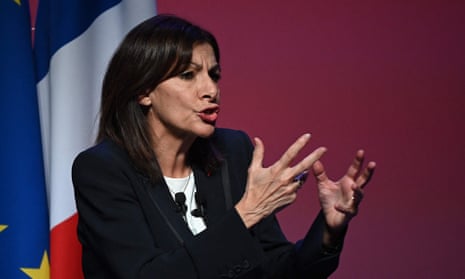Anne Hidalgo, the French Socialist presidential candidate, has repeated her plea for her leftwing rivals to unite, saying the left risked collapsing amid the alarming rise of the far-right.
“We’re at a critical moment for our democracy,” Hidalgo said before a rally in Perpignan. “The left is at risk of disappearing. Hate speech and xenophobia have saturated the airwaves for months.”
Taking the stage, she appealed to other candidates on the left not to split the vote: “Wake up, see the danger that is facing us.” French voters felt “despairing and anguished” that the left was being drowned out of the political debate, she said.
Hidalgo, the mayor of Paris, is polling at a historic low of between 3% and 5% for the first round of April’s presidential race. In a dramatic announcement on TV news last week, she said she supported a citizens’ vote in January to choose one candidate on the left who had the best chance of winning.
The left has never fielded so many different presidential candidates at this stage of the race. They include the Greens’ Yannick Jadot; Jean-Luc Mélenchon of La France Insoumise, who has a more leftwing programme than the Socialist party; and the Communist party’s Fabien Roussel. All have so far refused Hidalgo’s plea. They insist they will run separate campaigns, despite opinion polls putting each of them at no more than 10% and unable to reach the second round of voting.
Roussel said the problems of the left were far more deep-seated than just “a casting problem” of finding a joint candidate. “The problem of the left today is that it no longer speaks to the working class,” he said.
There is panic among some Socialists. The combined leftwing candidates currently account for between 24 and 29% of April’s first round vote, compared with 43% 10 years ago. The left has made a strong showing in recent regional elections and there is a new generation of young leftwing and green mayors in major cities, but it is in difficulty on the national stage.
The far right is becoming the country’s strongest force and has taken working-class voters from the left. Polls show it with at least 30% support with two major candidates. The traditional far right figure Marine Le Pen is running for a third time, but she has competition from the high-profile TV pundit Éric Zemmour, who has convictions for inciting racial hatred, and who has launched an outsider presidential bid, saying immigration and Islam will destroy France.
Hidalgo warned of “merchants of hatred … suffocating France” with their “morbid fantasies” of intolerance. She said she would not let Muslims be scapegoated or sit back while racist policies were discussed.
Emmanuel Macron is likely to declare his re-election bid next month. Polls currently show him making it to the final round of voting against either the right’s Valérie Pécresse, who has risen in the polls, or a candidate from the far right.
Voters on the left took to the streets in Paris and across France this weekend to urge parties on the left to join the “primary of the people”, a citizens’ initiative for a vote in mid-January to choose one leftwing candidate with the best chance of winning.
“It’s very demoralising that the left isn’t capable of making a decent showing in the presidential race, when growing numbers of people have taken part in climate marches as well as the Black Lives Matter movement, and when we want social justice and proper environmental protection,” said Emma, 25, a community manager for a health charity who lives in the suburbs south-west of Paris.
At the Paris protest, many hoped a new figure would step into the ring: Christiane Taubira, a former justice minister and member of parliament who supporters would like to see become France’s first black female president.
Taubira, who introduced same-sex marriage in 2013 when she served in the Socialist government of François Hollande, is also well-known for the 2001 law recognising slavery as a crime against humanity. She has been described by the professor of political science Rémi Lefebvre as “the moral conscience of the left”.
A recent poll by L’Obs magazine found she was the preferred candidate of voters on the left, but she has not yet said whether she would consider running at this late stage and in difficult circumstances with the left splintered into different factions. The L’Obs poll found that 86% of leftwing sympathisers would like one candidate to stand for a united left.
“The left is low in the polls and it is divided,” said Gérard Grunberg, a political scientist and director of the Telos website. “No force really wants to ally with another, there is no strategy ... What is fundamental is the disappearance of the centre left. For the first time since the foundation of the Socialist party more than a century ago, there is no force on the centre left.”
Grunberg said the party’s current low score confirmed its poor showing in the last presidential election in 2017, in which Macron won over centre-left voters when Hollande failed to stand for re-election after his presidency was mired in rows and internal feuding over economic policy.
